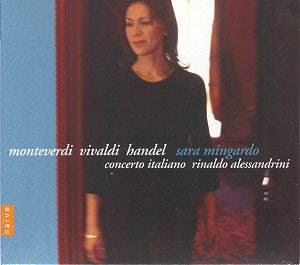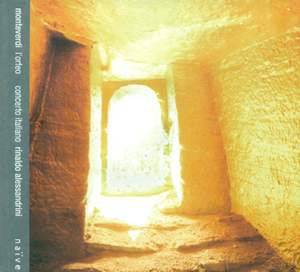Program: #22-09 Air Date: Feb 28, 2022
To listen to this show, you must first LOG IN. If you have already logged in, but you are still seeing this message, please SUBSCRIBE or UPGRADE your subscriber level today.
We journey with the director of the Concerto Italiano from Monteverdi’s “L’Orfeo”, to early 17th century Italian cantatas, and then to some lesser-recorded Bach keyboard works.
NOTE: All of the music on this program features the Concerto Italiano conducted by our guest, Rinaldo Alessandrini.
I. Arie, Madrigali, & Cantate. Naive/Opus 111 CD OP 30395.

1. Hor Ch'è Tempo di Morire "canzonetta Spirituale Sopra Alla Nanna" Per Voce E Continuo
Composed By – Tarquinio Merula (8:51)
2. Allor Che Tirsi Udia Cantata Per Voce E Continuo
Composed By – Giovanni Salvatore (8:33)
3. Deh, Memoria E Che Piu Chiedi Cantata Per Alto E Continuo
Composed By – Giacomo Carissimi (7:22)
4. Vorrei Baciarti A Due Alti E Continuo
Composed By – Claudio Monteverdi (5:28)
5-8. Erme E Solighe Cime - [Endiminione] In "La Calisto", Atto Secondo, Scena Primera
Composed By – Francesco Cavalli (6:44)
9. Se I Languidi Miei Sguardi - Lettera Amorosa
Composed By – Claudio Monteverdi (7:14)
10-13. Costei Ch'in Mezzo Al Volto Scritt'ha Il Moi Cor Cantata Per Alto E Continuo
Composed By – Giovanni Legrenzi (4:52)
14-19 Lungi Da Me Pensier Tiranno Cantata Per Alto E Continuo
Composed By – George Frideric Haendel (11:45)
II. Monteverdi: L’Orfeo. Naive CD OP 30439.

From Classics Today: Having just accidentally happened upon a 1949 recording of this opera led by Helmut Koch that presented it as a dirge beyond compare, I was stunned anew by this new Naïve set for its reminder of how valuable the last quarter century’s research truly is. The work’s beauty and theatricality, when presented correctly, are still very powerful. The story is passionately told here–the rhythms in the first two acts are rustic and lusty and there is such an all-encompassing feeling of celebration that we get swept up in it. The dances seem utterly natural. When the Messenger enters (in the person of the remarkable Sara Mingardo) with the dreadful news about Eurydice it hits everyone between the eyes. Never before have I sensed in a recording the absolute change of mood, the pinpoint turn from gaiety to tragedy. And the rest of the storytelling is just as vivid.
Perhaps it’s because the cast is Italian and they use their language with such ease, natural lilt, and emphasis that they are actually “speaking in music”, which after all was the whole gimmick behind opera. The vocal embellishments heighten the drama, as they should, and do not draw attention to themselves. Alessandrini opts for quick tempos except when he absolutely does not; in the accompanying booklet he argues for flexibility in delivering the recitatives so that they fall into natural speech patterns, and his choices here simply seem right.
Furio Zanasi (billed here as a tenor but as a baritone on other recordings; he sounds like a high baritone) sings Orfeo with great virtuosity and emotional restraint. Even in “Rendetimi il mio bene” near the close of the third act he does not overstate his case at first, and his plea, increasing in volume, is enormously effective. Sergio Foresti’s Caronte is nicely sepulchral, which somewhat undercuts Antonio Abete’s more matter-of-fact Plutone, but Anna Simboli makes up for it as Prosperina. None of the singers uses “white” voice; vibrato is subdued but present. This makes sense given Alessandrini’s extroverted use of the instruments–the cornets and drums are brilliant.
| La Favola D'Orfeo, Opera, SV 318 | |||
| Act I | |||
| 1-1 | Toccata | 1:51 | |
| 1-2 | Ritornello - La Musica: "Dal Mio Permesso Amato" | 5:11 | |
| 1-3 | Pastore, Coro, Ninfa: "In Questo Lieto E Fortunato Giorno" | 3:35 | |
| 1-4 | Coro, Pastore: "Lasciate I Monti" | 2:47 | |
| 1-5 | Orfeo, Euridice, Coro: "Rosa Del Ciel" | 3:50 | |
| 1-6 | Coro Di Nife: "Vieni, Imeneo" | 2:07 | |
| 1-7 | Ritornello - Coro: "Alcun Non Sia Che Disperato In Preda" | 3:49 | |
| Act II | |||
| 1-8 | Sinfonia | 1:18 | |
| 1-9 | Due Pastori, Coro, Orfeo: "In Questo Prato Adorno" | 4:00 | |
| 1-10 | Messaggiera, Pastori, Orfeo: "Ahi Caso Acerbo!" | 3:12 | |
| 1-11 | Messaggiera, Pastori: "In Un Fiorito Prato" | 3:41 | |
| 1-12 | Orfeo: "Tu Se' Morta, Mia Vita, Ed Io Respiro" | 2:26 | |
| 1-13 | Coro, Messaggiera: "Ahi Caso Acerbo" | 2:46 | |
| 1-14 | Sinfonia | 1:19 | |
| 1-15 | Pastori, Coro: "Chi Ne Consola, Ahi Lassi?" | 5:37 | |
| Act III | |||
| 2-1 | Sinfonia | 1:18 | |
| 2-2 | Orfeo: "Scorto Da Te, Mio Nume" | 1:18 | |
| 2-3 | Speranza, Orfeo, Caronte: "Ecco L'Altra Palude" | 4:58 | |
| 2-4 | Sinfonia | 0:51 | |
| 2-5 | Orfeo: "Possente Spirito" | 4:17 | |
| 2-6 | Ritornello (arpa) - Orfeo: "Orfeo Son Io" | 4:17 | |
| 2-7 | Caronte: "Ben Mi Lusinga Alquanto" | 1:47 | |
| 2-8 | Sinfonia - Orfeo: "Ei Dorme" | 2:50 | |
| 2-9 | Sinfonia - Coro Di Spiriti Infernali | 3:07 | |
| Act IV | |||
| 2-10 | Proserpina, Plutone, Spiriti: "Signor Quel Infelice" | 7:48 | |
| 2-11 | Orfeo, Spiriti, Euridice: "Qual | 5:32 | |
| 2-12 | Sinfonia - Coro Di Spiriti: "È La Virtute un Raggio" | 2:12 | |
| 2-13 | Sinfonia | 0:42 | |
| Act V | |||
| 2-14 | Ritornello - Orfeo, Echo: "Questi I Campi Di Tracia" | 7:28 | |
| 2-15 | Sinfonia - Apollo, Orfeo: "Perch'a Lo Sdegno" | 4:13 | |
| 2-16 | Apollo & Orfeo: "Saliam Cantando Al Cielo" | 1:02 | |
| 2-17 | Ritornello - Coro: "Vanne, Orfeo, Felice A Pieno" | 0:59 | |
| 2-18 | Moresca |
Pianti, Sospiri E Dimandar Mercede Cantata Per Alto E Continuo Rv 676
Composed By – Antonio Vivaldi
III. Bach: Klavierwerke. Naive CD 30581.

Rinaldo Alessandrini usually records with his ensemble Concerto Italiano: his solo harpsichord recital discs are far less frequent and all the more cherished for their rarity value. Here Bach has a special place, as in his previous releases A la manera italiana and Præludien & Fugen.
This third all-Bach recital brings together around thirty short pieces from among the composer’s two hundred or so keyboard works, grouping them according to their kinship of key - like a mirror in three sections reflecting three different tonalities.
This recital’s route lets us wander around an extended archive of works from Bach’s preludes, fugues, sinfonias, inventions, fantasies, ricercar and the Sonata for solo violin BWV 1003 - but with their chronology entirely effaced, their order recomposed by the soloist.
As Esteban Hernández Castello explains in the accompanying booklet: “This enables us to range through the whole gamut of musical languages the composer employed, from the simplest to the most elaborate, including - and why not - pieces whose attribution is still uncertain.”
In Rinaldo Alessandrini’s playing we again encounter the unpretentious elegance that is his hallmark, his attention to detail and nuance and the radiant thoughtfulness he bestows on the polyphony - qualities that have been refined over the years by his work with Concerto Italiano and his intensive cultivation of the vocal repertoire.
Prelude in A minor, BWV931 [0:59]
Two-part Invention No 13 in A minor, BWV784 [1:12]
Three-part Invention (Sinfonia) No 13 in A minor, BWV799 [1:46]
Prelude & Fugue Book 1 No 20 in A minor, BWV865 [6:38]
Prelude & Fugue Book 2 No 20 in A minor, BWV889 [4:25]
Fantasia & Fugue in A minor, BWV904 [8:47]
Prelude in D minor, BWV940 [0:40]
Two-part Invention No 4 in D minor, BWV775 [0:56]
Three-part Invention (Sinfonia) No 4 in D minor, BWV790 [1:52]
Prelude & Fugue Book 1 No 6 in D minor, BWV851 [3:50]
Prelude & Fugue Book 2 No 6 in D minor, BWV875 [3:44]
Sonata for Keyboard in D minor, BWV964 [18:59]
(originally from Sonata for solo violin BWV 1003)
Prelude in C minor, BWV934 [2:29]
Two-part Invention No 2 in C minor, BWV773 [2:00]
Three-part Invention (Sinfonia) No 2 in C minor, BWV788 [2:07]
Prelude & Fugue Book 1 No 2 in C minor, BWV847 [3:31]
Prelude & Fugue Book 2 No 2 in C minor, BWV871 [3:58]
Fantasia in C minor, BWV906 [5:05]
Ricercar a 3 from the Musical Offering, BWV1079 [6:04]
Composer Info
Tarquinio Merula, Giovanni Salvatore, Giacomo Carissimi, Claudio Monteverdi, Francesco Cavalli, Giovanni Legrenzi, George Frideric Haendel, Antonio Vivaldi
CD Info
Naive/Opus 111 CD OP 30395, Naive CD OP 30439, Naive CD 30581, BAch